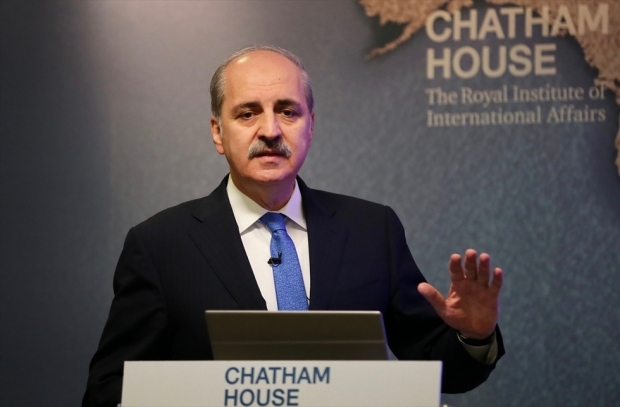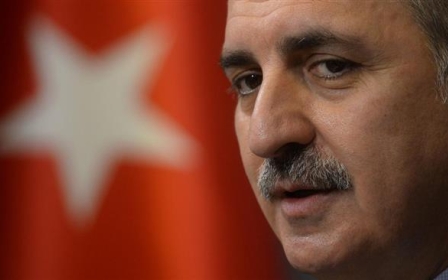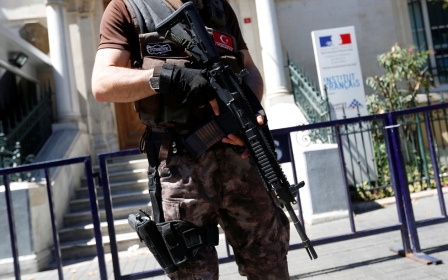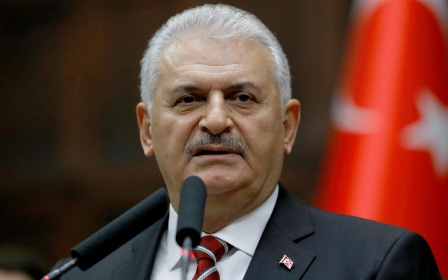Q&A with Turkey's Numan Kurtulmus: What to expect in Turkey-US relations
MEE: What is Turkey’s relationship with Donald Trump? On the one hand you have given warm messages to the president-elect, and that could be to do with [your hopes about extraditing] Gulen, or the support you feel you will get from appointees like national security adviser Lieutenant General Michael Flynn. But on the other, here you have a man who as a presidential candidate has made outrageous statements about Muslims, statements that even George W Bush would recoil from. Why is Turkey so warm towards Trump?
NK: We are expecting a new start to Turkish-American relations. We have a positive expectation in two areas. The first is related to Gulen. We expect the new administration of the United States either to detain him or extradite him to Turkey. We have given them legal evidence. We are hopeful, because they have the choice. Either they continue to keep Gulen as a leader of a terrorist coup plot in Pennsylvania, or they strengthen their relations with the Turkish people, 80 million of them. So the choice is for the American policymakers. We are optimistic that the new administration will choose the Turkish nation, rather than Fetullah Gulen himself. The second point is [US] relations with the PYD. It is very clear that the American policymakers are using the PYD as an instrument in the proxy war in the region. But it is a small group of people, let’s say between 5,000 and 10,000 fighters. On the other side there is a Turkish nation 80 million strong. And Turkey is the only Islamic country which has democracy, economic and political stability and historic relations with the European continent. I am personally very optimistic that they will choose to improve the relationship with Turkey. We expect from the new administration positive steps.
MEE: And Trump’s words about Muslims?
NK: I don’t think the president-elect will change the multi-ethnic and multi-religious diversity of the United States. If they start some anti-Islamist activities, as an internal political instrument, it will effect the stability of society in the US. So I regard his statements [against Muslims] as an attempt to consolidate nationalist forces inside the United States.
MEE: You are the minister in charge of the media in Turkey, and one point of friction with Europe is the number of journalists who have been arrested, and the number of media outlets that have been closed down since 15 July. Turkey’s position is that these arrests are related to the coup attempt and to the PKK. But how can you justify the arrests in Cumhurryiet, which is a centre left Kemalist newspaper? Is the rule of law being applied, or are you not just imprisoning journalists for doing their job?
NK: If you count the number of daily news magazines in Turkey, approximately half of them are against the position of the government. They are on the opposition side.
MEE: But you have closed 100 media outlets since the coup.
NK: Yes of course, because some of them clearly supported FETO organisation, also they got money from the same organisation. Some of them supported PKK.
MEE: And that includes Cumhurryiet?
NK: Cumhurryiet is something else. It started on August 18, because of a case started by the foundation that owns the organisation. It's a legal procedure. Some of the members of the foundation went to the courts and opened a file for the inquiry. The investigation started from that point. It is a debate which started inside the foundation and resulted in a court case. The courts started to investigate the magazine, the journalists. It uncovered allegations against some of the journalists supported FETO or the PKK. This is an independent legal procedure. It continues. We do not know what the result will be. The court has released some of the journalists. Some remain under detention. A statement was issued by a CHP politician to the effect that Cumhurryiet was open to all views, pro-FETO or the Kurdish nationalists, but it became impossible to write as a Kemalist author for the publication.
MEE: But there is a crackdown on the free press.
NK: Even today we look upon the news magazines in Turkey, almost half of them are oppositional. A journalist can explain his view against any position of the government or any member of the government. We have free journalism in Turkey. Almost all of the cases are not about journalistic activity, but because of support for terrorist organisations or propagandising for them.
MEE: Thousands have been suspended from their jobs. How many have got their jobs back?
NK: It is really a very tough procedure. 1973 was the first time FETO stole the questions of the military entrance exam and provided the answers to their followers. They started to hide themselves in all the different state organisations, the military, the police department, the judiciary. Four years ago they got almost half of the votes of the attorneys and judges for the election of the Supreme Courts of Attorneys and Judges. They have a very strong network inside the civil service. That is why it will take some time. But we opened the door for people suspended from the civil service to apply to their institutions. In the police department, in the judiciary system, teachers, more than 15,000 people are back in their positions.
MEE: How long is the state of emergency going to last? If it carries on beyond 20 January, would it be possible to hold a referendum on the presidency in these conditions?
NK: When we declared a state of emergency the aim was to complete all duties within three months. But we found that they [FETO] infiltrated all state organisations for the last 40 years. We hope another three months will be enough to clear them out.
MEE: The state of emergency will be over by 20 January?
NK: We hope so.
MEE: This was a coup against parliament, which was bombed. Why not keep Turkey as a parliamentary democracy?
NK: A presidential system would not necessarily exclude parliament. There will be a parliament to pass laws and to hold government accountable.
MEE: Why do you need a presidential system?
NK: In 2014, Turkey chose their president in a direct vote. So the president has the executive power he derives from the constitution and he has the legitimacy of the public vote. In the meantime, there is a second executive body, which is the government. Now we have to unify these two executive bodies. The new executive will be totally independent from parliament. So we will have a parliament with stronger powers and our main aim is to give strength to the executive, to make it one body, rather than have two powerful executive bodies.
MEE: Is Europe about to lose Turkey?
NK: Turkey is a key, strategic country for the European continent as a whole and for the European Union. Turkey is a staging post for illegal immigration from east to west and Turkey is an oasis in an area of turbulence. So we have strategic, historic, geographic, geo-cultural relations with our European allies. But unfortunately we have witnessed double standards from some of the policymakers in the European Union. During the recent history of relations between Europe and Turkey, some policymakers from the European side offered Turkey a privileged partnership, although we were waiting for full membership of the European Union. After the 15 July coup attempt, we expected strong alliance with our European allies to show their solidarity to defend Turkish democracy, because Turkey is the only democratic country with an Islamic background.
We have economic and political stability for the last 15 years. We have decent natural democracy in Turkey, although we have some new steps to be taken in the near future to create a more democratic atmosphere in Turkey. Unfortunately, very few of the European members showed their solidarity with the Turkish people and Turkish democracy. The British government was an exceptional case in defending Turkish democracy. So actually, it was a nightmare for the people of Turkey at that time. We nearly went over a cliff edge. We were expecting real support from Europe, but unfortunately we did not see it.
The second issue is the visa liberalisation process and the flow of the migrants. As you know it was supposed to be a simultaneous agreement. We expected to start visa liberalisation in July this year. We almost completed all related reforms, even passing some laws through the parliament and government decrees. We applied 73 major points in reforms to the Turkish legal system. We managed to stop the illegal refugee flow from Turkey to the European countries via the Greek islands. I was the minister responsible for the refugee issue in the last government. We had around 5,000-6,000 illegal immigrants every day. Now it is zero. So we have managed to stop them on the borders of Turkey and on the seas. Unfortunately Europe did not fulfill its promises on visa waivers for Turkish citizens. So the Turkish people are very strongly disappointed, both in the expectation that Europe would defend democracy in Turkey, and also the hope of starting the process of visa liberalisation.
MEE: Where does this end? What happens next? Will there be a referendum in Turkey on the EU accession negotiations?
NK: Actually, as you know, the support for accession partnership for the European Union was about 70 percent five years ago, but because of the mistakes of European policymakers we see very little support for full membership in the EU. I don’t know the latest poll, but it is clearly below 50 percent. So we need to repair relations and the European Union needs to repair relations with Turkey. Visa liberalisation and stopping the flow of illegal immigrants were two meaningful instruments to cooperate very closely with the European Union, but unfortunately it did not work. That’s why we are expecting the European side to try to repair relations with Turkey.
MEE: Could there come a point where you let refugees through your borders?
NK: Turkey was left on its own to cope with refugees by the European Union and its Western allies. We have already spent more than $13bn. We have more than three million Syrians and some Iraqi refugees inside our borders. They became a huge burden on the Turkish economy and it created social problems. I don’t want to say any negative things against the refugees, because we accepted them as our historical responsibility, as neighbours of the Syrians and Iraqis. Unfortunately the international community has not done the same. The latest figure is $500m. It is nothing like the total sums that Turkey has spent. And we got almost nothing from the $3bn we were promised from the EU. So relations with the EU over refugees have not gone well. We were open and we tried to fulfill whatever we agreed with the EU. The EU unfortunately has not fulfilled its side of the bargain.
MEE: Turkish troops have now been killed in northern Syria by Syrian government air strikes and Turkey is in discussions with Russia. Is there a deal with Russia that gives east Aleppo to the regime, backed by Russia, and allows Turkish troops to advance towards al-Bab?
NK: The aim of the Euphrates Shield operation is very clear. It is to clear the area of ISIS and the PYD. The area of operation is 5,000 square kilometres. From that part of northern Syria, Daesh [Islamic State] launched several operations against the Turkish border, also PYD forces clashed with the Free Syrian Army forces in the region. So our aim is very clear. We will clear this land from Daesh and PYD.
MEE: But the Turkish field of operation is close to Aleppo. What’s your position on it?
NK: Aleppo is not our intention. Our main aim is to go to al-Bab.
MEE: Would you allow Syrian President Bashar al-Assad’s forces and Iranian-backed militias to retake eastern Aleppo?
NK: No. The main issue regarding east Aleppo is humanitarian aid. Now the people of Aleppo are under severe danger. They are hungry. They lack medical supplies. They don’t have enough supplies for their children. Their hospitals are being bombed. There is a humanitarian tragedy there. It is the responsibility of the international community to stop the regime forces and the Russians in Aleppo.
MEE: So there is no agreement between Turkey and Russia about Aleppo?
NK: We have talks between Russia and Turkey. We hope we will agree very soon on providing humanitarian support for the people of Aleppo and to stop the aggression of the Syrian regime. Aleppo and Mosul are the two main cities which reflect the main ethno-religious balance in the region. If we lose the existing balance in Aleppo, it will create more instability in the region. That is why we are trying to find a solution by talking to the Russians. To stop the humanitarian tragedy and to start peace talks for a real solution in Syria. As agreed between Turkey and the US, all forces of the PYD must go to the east of the Euphrates.
MEE: But that is not happening. [Chairman of the Joint Chiefs of Staff, General Joe] Dunford made promises in Ankara about the PYD withdrawing from Manbij, which are not being kept.
NK: Yes unfortunately. Our intention is very clear. We have repeatedly told the Americans that our operations are in the national security interest of Turkey. This is not about the future of Syria.
MEE: Are you in favour of Turkish troops going into Mosul?
NK: We don’t want to intervene in the internal affairs of Iraq, but again Mosul is one of the most strategic cities in the region. We have our relatives, friends and neighbours there. We know each detail of Mosul city itself. It is related to Turkey’s national security in two ways. If we cannot apply a proper plan to stop terrorist Daesh activity in Mosul, it will again create very heavy problems for Turkey. But the real question is what will be the status of Mosul after Daesh. We have never accepted the possibility that Daesh will be replaced by another terrorist organisation, such al-Hashd al-Shaabi or PYD. Mosul must maintain its status as a multi-ethnic, multi-religious and multi-sectarian city and the international community should observe the rights of all the different social segments of Mosul, otherwise it will become a focal point for imbalance and instability in Iraq.
MEE: Turkey has just resumed diplomatic relations with Israel. The state of Israel is going further and further along the path of alienating and suppressing its Palestinian citizens. Its political leaders accuse Palestinians of collectively setting fire to Jewish areas, and there is a bill before the Knesset to silence the Muslim call to prayer. What is your reaction?
NK: We have recreated diplomatic relations with Israel, but that does not mean we have changed our position towards the aggressive policies of Israel. We will never forget the martyrs of the Mavi Marmara. We will never give up our support for the rights of Palestinians. So the latest positions before the Israeli parliament are unacceptable. Historically, Jerusalem itself is the heart of multi-ethnicity and multi-religious culture. It reflects diversity. So the sound of bells in the churches, the sounds of religious Jews on the Wailing Wall and the sound of the Muslim call to prayer are parts of the history of Jerusalem. If Israeli policymakers stop the azan [call to prayer], it means they are putting a stop to the diversity and multi-cultural richness of the city of Jerusalem. It is not only against the religious freedoms of Muslims in Jerusalem, it is an open assault on spirit of Jerusalem itself. It is unacceptable.
Middle East Eye propose une couverture et une analyse indépendantes et incomparables du Moyen-Orient, de l’Afrique du Nord et d’autres régions du monde. Pour en savoir plus sur la reprise de ce contenu et les frais qui s’appliquent, veuillez remplir ce formulaire [en anglais]. Pour en savoir plus sur MEE, cliquez ici [en anglais].





